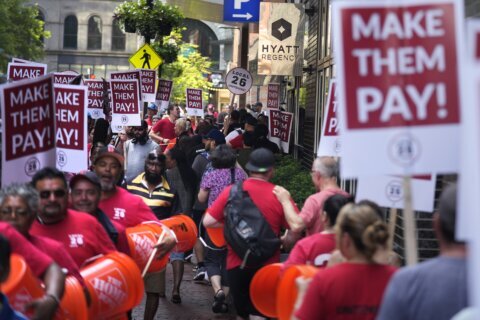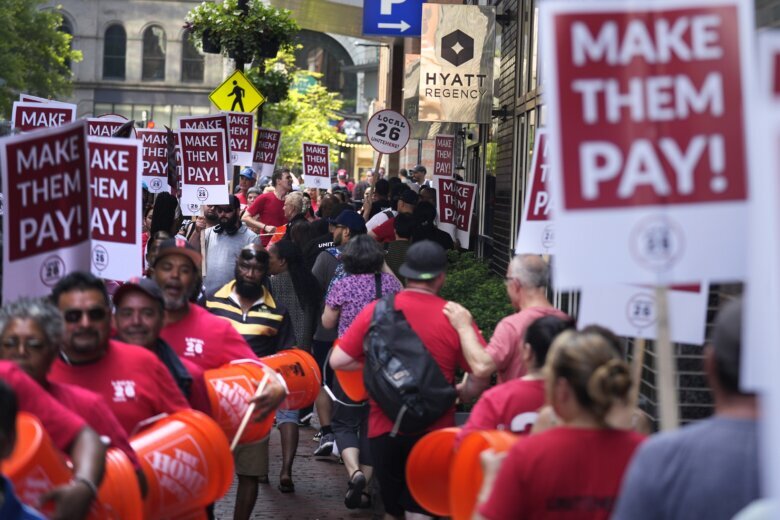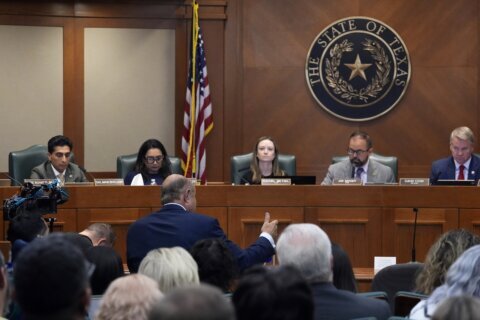
With up to 17 rooms to clean each shift, Fatima Amahmoud’s job at the Moxy hotel in downtown Boston sometimes feels impossible.
There was the time she found three days worth of blond dog fur clinging to the curtains, the bedspread and the carpet. She knew she wouldn’t finish in the 30 minutes she is supposed to spend on each room. The dog owner had declined daily room cleaning, an option that many hotels have encouraged as environmentally friendly but is a way for them to cut labor costs and cope with worker shortages since the COVID-19 pandemic.
Unionized housekeepers, however, have waged a fierce fight to restore automatic daily room cleaning at major hotel chains, saying they have been saddled with unmanageable workloads, or in many cases, fewer hours and a decline in income.
The dispute has become emblematic of the frustration over working conditions among hotel workers, who were put out of their jobs for months during pandemic shutdowns and returned to an industry grappling with chronic staffing shortages and evolving travel trends.
Some 10,000 hotel workers represented by the UNITE HERE union walked off the job Sunday at 24 hotels in eight cities, including Honolulu, Boston, San Francisco, San Jose, San Diego and Seattle. Hotel workers in other cities could strike in the coming days, as contract talks stall over demands for higher wages and a reversal of service and staffing cuts. At total of 15,000 workers have voted to authorize strikes.
“We said many times to the manager that it is too much for us,” said Amahmoud, whose hotel was among those where workers have authorized a strike but have not yet walked out.
Michael D’Angelo, Hyatt’s head of labor relations for the Americas, said the company’s hotels have contingency plans to minimize the impact of the strikes. “We are disappointed that UNITE HERE has chosen to strike while Hyatt remains willing to negotiate,” he said.
In a statement before the strikes began, Hilton said it was “committed to negotiating in good faith to reach fair and reasonable agreements.” Marriott and Omni did not return requests for comments.
The labor unrest serves as a reminder of the pandemic’s lingering toll on low-wage women, especially Black and Hispanic women who are overrepresented in front-facing service jobs. Although women have largely returned to the workforce since bearing the brunt of pandemic-era furloughs — or dropping out to take on caregiving responsibilities — that recovery has masked a gap in employment rates between women with college degrees and those without.
The U.S. hotel industry employs about 1.9 million people, some 196,000 fewer workers than in February 2019, according to Bureau of Labor Statistics. Nearly 90% of building housekeepers are women, according to federal statistics.
It’s a workforce that relies overwhelmingly on women of color, many of them immigrants, and which skews older, according to UNITE HERE.
Union President Gwen Mills characterizes the contract negotiations as part of long-standing battle to secure family-sustaining compensation for service workers on par with more traditionally male-dominated industries.
“Hospitality work overall is undervalued, and it’s not a coincidence that it’s disproportionately women and people of color doing the work,” Mills said.
The union hopes to build on its recent success in southern California, where after repeated strikes it won significant wage hikes, increased employer contributions to pensions, and fair workload guarantees in a new contract with 34 hotels. Under the contract, housekeepers at most hotels will earn $35 an hour by July 2027.
The American Hotel And Lodging Association says 80% of its member hotels report staffing shortages, and 50% cite housekeeping as their most critical hiring need.
Kevin Carey, the association’s interim president and CEO, says hotels are doing all they can to attract workers. According to the association’s surveys, 86% of hoteliers have increased wages over the past six months.
“Now is a fantastic time to be a hotel employee,” Carey said in an emailed statement to The Associated Press.
Hotel workers say the reality on the ground is more complicated.
Maria Mata, 61, a housekeeper at the W Hotel in San Francisco, said she earns $2,190 every two weeks if she gets to work full time. But some weeks, she only gets called in one or two days, causing her to max out her credit card to pay for household expenses
“It’s hard to look for a new job at my age. I just have to keep the faith that we will work this out,” Mata said.
Guests at the Hilton Hawaiian Village often tell Nely Reinante they don’t need their rooms cleaned because they don’t want her to work too hard. She said she seizes every opportunity to explain that refusing her services creates more work for housekeepers.
Since the pandemic, UNITE HERE has won back automatic daily room cleans at some hotels in Honolulu and other cities, either through contract negotiations, grievance filings or local government ordinances.
But the issue is back on the table at many hotels where contracts are expiring. Mills said UNITE HERE is striving for language to make it difficult for hotels to quietly encourage guests to opt out of daily housekeeping.
The U.S. hotel industry has rebounded from the pandemic despite average occupancy rates that remain shy of 2019 levels, largely due to higher room rates and record guest spending per room. Average revenue per available room, a key metric, is expected to reach a record high of $101.84 in 2024, according the hotel association.
David Sherwyn, the director of the Cornell University Center for Innovative Hospitality Labor & Employment Relations, said UNITE HERE is a strong union but faces a tough fight over daily room cleaning because hotels consider reducing services part of a long-term budget and staffing strategy.
“The hotels are saying the guests don’t want it, I can’t find the people and it’s a huge expense,” Sherwyn said. “That’s the battle.”
Workers bristle at what they see as moves to squeeze more out of them as they cope with erratic schedules and low pay. While unionized housekeepers tend to make higher wages, pay varies widely between cities.
Chandra Anderson, 53, makes $16.20 an hour as a housekeeper at the Hyatt Regency Baltimore Inner Harbor, where workers have not yet voted to strike. She is hoping for a contract that will raise her hourly pay to $20 but says the company came back with a counteroffer that “felt like a slap in the face.”
Anderson, who has been her household’s sole breadwinner since her husband went on dialysis, said they had to move to a smaller house a year ago in part because she wasn’t able to get enough hours at her job. Things have improved since the hotel reinstated daily room cleaning earlier this year, but she still struggles to afford basics like groceries.
Tracy Lingo, president of UNITE HERE Local 7, said the Baltimore members are seeking pensions for the first time but the biggest priority is bringing hourly wages closer to those in other cities.
“That’s how far behind we are,” Lingo said.
—-
This story has been updated to correct that Unite Here is now saying that workers at 24 hotels are on strike, not 25.
______
Associated Press Writer Jennifer Kelleher in Honolulu contributed to this story.
____
The Associated Press’ women in the workforce and state government coverage receives financial support from Pivotal Ventures. AP is solely responsible for all content. Find AP’s standards for working with philanthropies, a list of supporters and funded coverage areas at AP.org.
Copyright © 2024 The Associated Press. All rights reserved. This material may not be published, broadcast, written or redistributed.







